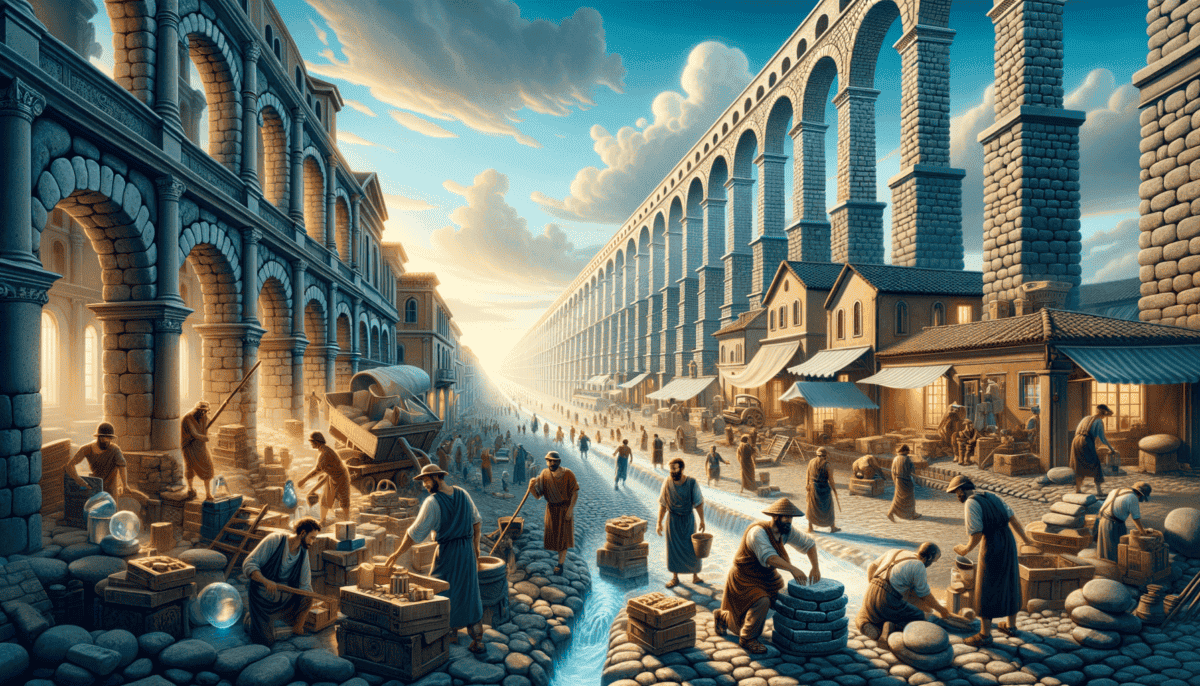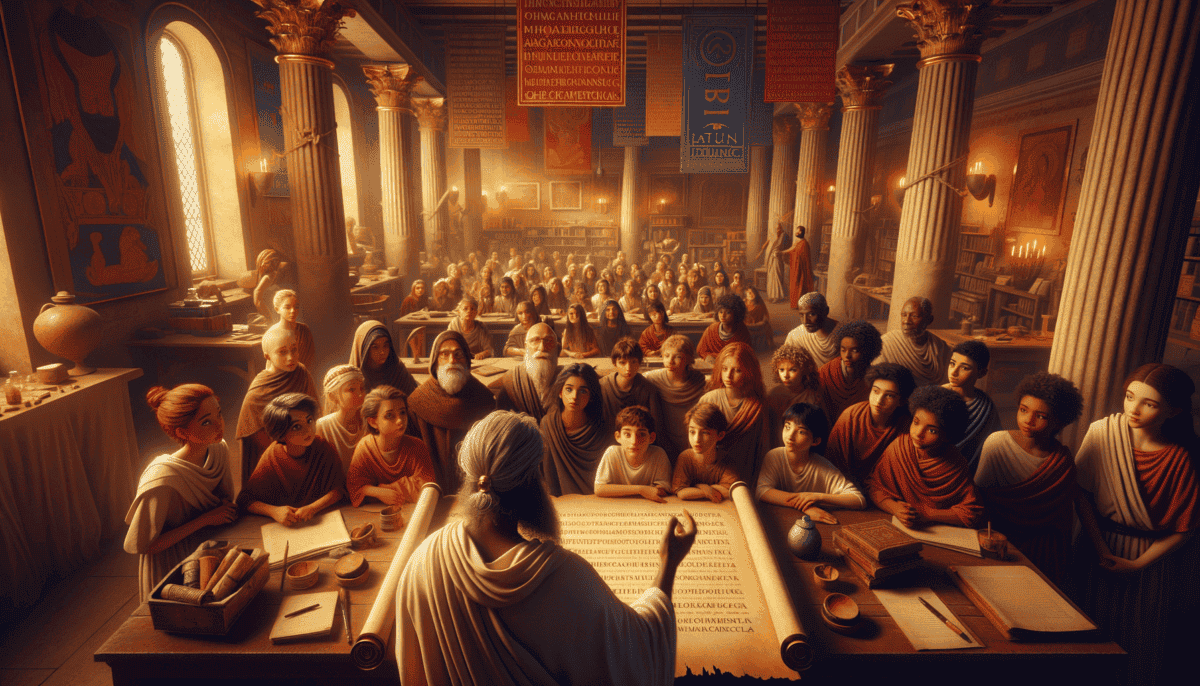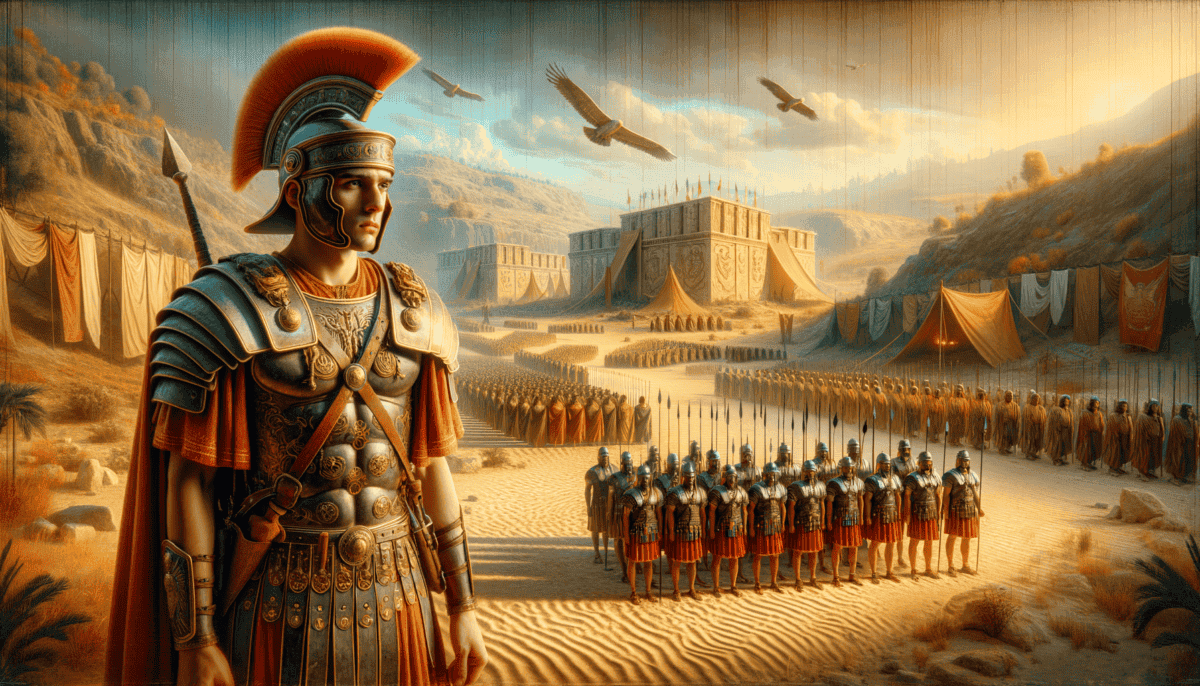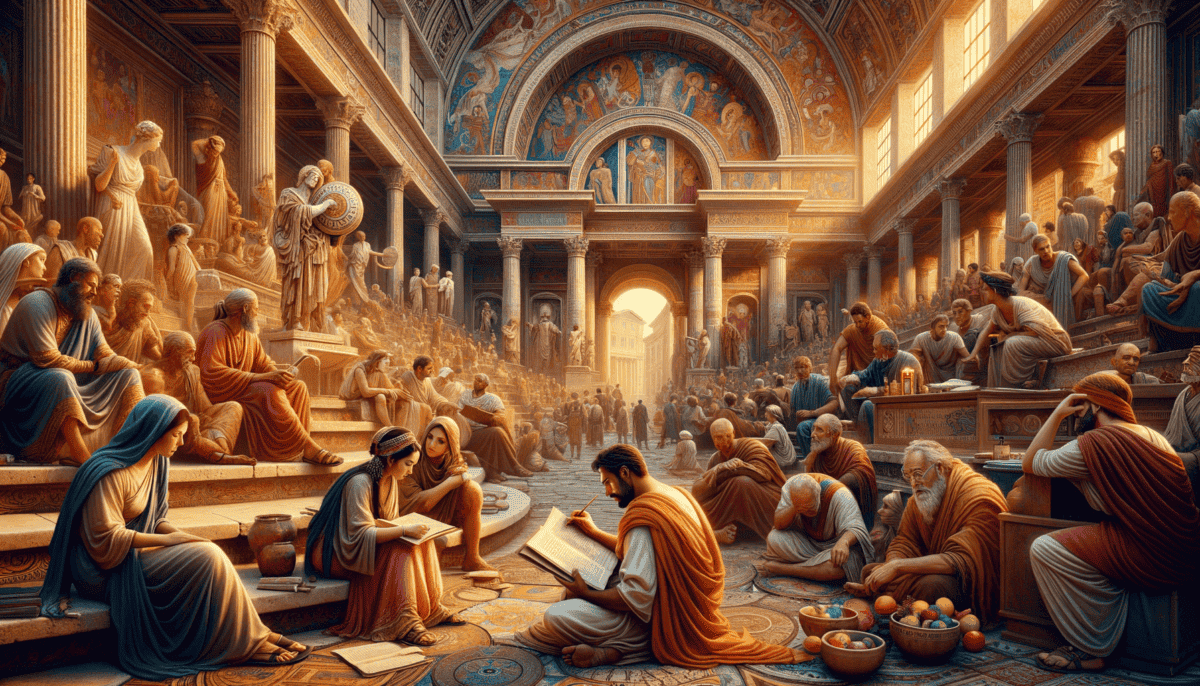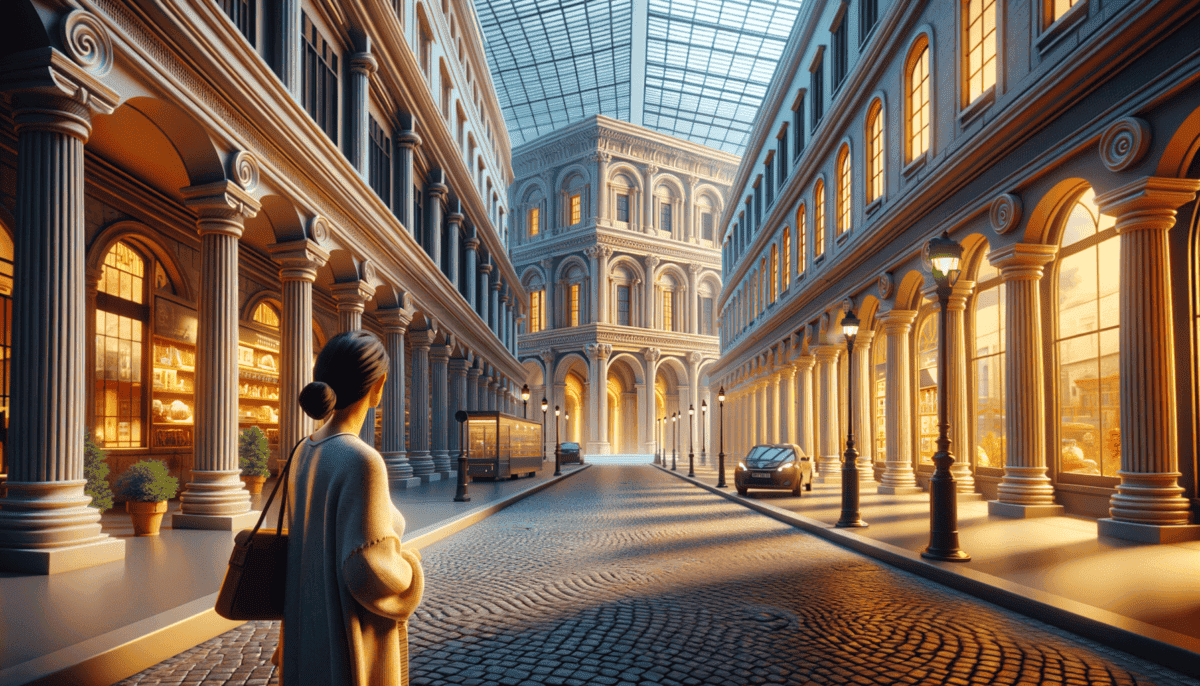The Little Explorer Discovers Rome
Marcus bounced excitedly in his seat as the time machine hummed to life. His magical history book had transformed into a glowing portal, ready to whisk him away to Ancient Rome!
"Wow!" Marcus gasped as he stepped out onto a busy Roman street. The sights and sounds were amazing! People wore long white togas, and the buildings reached up toward the bright blue sky.
A friendly girl about his age waved from nearby. She wore a simple purple tunic and sandals.
"Hi! I'm Julia," she smiled. "Welcome to Rome! Want me to show you around our city?"
Marcus nodded eagerly. "Yes, please! I've never seen anything like this before!"
Julia took his hand and led him through the crowded streets. The ground beneath their feet was made of carefully fitted stone blocks.
"These are our famous Roman roads," Julia explained proudly. "They connect our whole empire! People say all roads lead to Rome." ️
They walked past tall columns and grand buildings made of gleaming white marble. The biggest building Marcus had ever seen stood before them.
"That's the Colosseum!" Julia announced. "It's where we watch gladiator shows and other fun events. It can hold 50,000 people!" ️
Marcus's eyes grew wide. "It's enormous! How did you build something so big?"
"Our architects are very clever," Julia said proudly. "They invented special concrete that's stronger than regular stone. And see those round arches? They help hold up all that weight!"
They continued walking until they reached a huge open square surrounded by temples and important buildings.
"This is the Forum – the heart of Rome," Julia explained. "It's like a big outdoor mall and meeting place. People come here to shop, worship at the temples, or hear important announcements."
Marcus watched as people hurried past carrying baskets of bread, rolls of cloth, and clay pots. Some wore fancy togas with purple stripes, while others had simple brown tunics.
• Temple of Saturn
• Temple of Venus
• Senate House
• Law Courts
"Look!" Julia pointed to a tall building with columns. "That's where our senators meet to make laws and important decisions. Rome isn't just ruled by emperors – we have a senate too!"
As the sun began to set, the white marble buildings glowed golden in the evening light. Delicious smells wafted from nearby food shops selling bread, olives, and roasted meats.
"This is amazing," Marcus said happily. "I can't believe how big and beautiful everything is!"
Julia beamed with pride. "Rome is the greatest city in the world! There's so much more to see – the aqueducts that bring us water, the public baths, the chariot racing track…"
"Can we see all of that tomorrow?" Marcus asked hopefully.
"Of course!" Julia replied. "The fun is just beginning. Wait until you try our famous Roman bread and see a gladiator training session!"
Marcus could hardly wait to explore more of this incredible ancient city. As the stars began twinkling overhead, he knew his adventure in Rome was going to be unforgettable.
Roads, Inventions, and Amazing Builders
The next morning, Marcus met Julia at sunrise. She carried a basket filled with fresh bread and figs for their day of exploring.
“Today I’ll show you how we Romans build amazing things!” Julia said excitedly. “Look up there!”
Marcus gasped as he saw a huge stone bridge carrying water high above their heads. Water flowed through it like a river in the sky!
“That’s an aqueduct,” Julia explained proudly. “It brings fresh water from the mountains to everyone in Rome. We have eleven of them!”
They walked along a perfectly straight road made of fitted stones. Julia hopped from stone to stone.
“Our roads are special,” she said. “They’re built in layers, like a giant cake! First gravel, then sand, then these big stones on top. They never get muddy, even when it rains!”
A group of workers nearby were building a new section of road. Marcus watched in amazement as they carefully fit the stones together like puzzle pieces.
“Look how they make sure it’s perfectly flat,” Julia pointed. “They use that tool with water in it – it’s called a level!” ️
Soon they reached a massive construction site. Workers were building an arch using a wooden frame.
“This is my favorite part,” Julia whispered. “Watch what happens when they finish the arch!”
The workers placed the final stone at the top of the arch. Then they carefully removed the wooden frame. The arch stood strong and tall all by itself!
• The Colosseum
• The Pantheon
• The aqueducts
• The roads
• The Forum
“How does it stay up?” Marcus asked in wonder.
“It’s the special shape,” Julia explained. “Each stone pushes against the others to make it strong. We use arches everywhere – in bridges, buildings, and even underground sewers!”
They visited a workshop where workers mixed concrete in large tubs. The smell of lime and volcanic ash filled the air.
“Our concrete is better than regular stone,” Julia said proudly. “It gets stronger over time, even in water! That’s how we build our huge harbors.”
Later, they watched workers lift heavy stones using a clever machine with ropes and pulleys.
“That’s a crane,” Julia explained. “See how those slaves can lift stones that weigh as much as ten people? The machine makes heavy things feel light!”
Marcus noticed everything was built with careful measurements. “Your builders must be very smart,” he said.
Julia nodded. “We plan everything carefully first. My father is an architect – he draws pictures of buildings before we build them. Want to see his workshop?”
In her father’s workshop, Marcus saw detailed drawings of buildings, bridges, and roads. There were measuring tools and models made of wood.
“These tools help us build things that last forever,” Julia’s father said with a smile. “Many of our buildings will still be standing thousands of years from now!”
As the sun set, Marcus looked back at the city with new appreciation. The Romans weren’t just builders – they were inventors and problem-solvers who changed the world!
“Tomorrow,” Julia said with a twinkle in her eye, “I’ll teach you some Latin words. Did you know many of your words came from our language?”
The Language of Emperors and Heroes
Marcus woke up excited to learn about Roman words. He met Julia in the bustling marketplace, where merchants called out in Latin to sell their goods.
“Salve!” Julia waved. “That means ‘hello’ in Latin. Try saying it!”
“Salve!” Marcus repeated, grinning. The word felt fun on his tongue.
They walked past a school where young Roman children sat on benches, practicing their letters on wax tablets.
“Listen to them!” Julia said. The children were reciting:
“Unus, duo, tres, quattuor, quinque!”
(One, two, three, four, five!)
“Even numbers come from Latin,” Julia explained. “December means ‘tenth month’ in our calendar!”
They stopped to watch a group of senators in white togas walking to a meeting. Their voices carried across the square as they debated in Latin.
“Latin is the language of important people,” Julia said proudly. “All across our empire, from Britain to Egypt, people learn Latin to read our laws and talk to Roman officials.”
A storyteller gathered children around him in the square. He told exciting tales about Roman heroes:
“Hear the story of brave Horatius, who defended Rome’s bridge alone against an entire army! And noble Cincinnatus, who left his farm to save Rome, then went right back to his plow!”
Marcus was amazed. “Your stories are full of brave heroes!” he said.
“Yes, and we write them all down,” Julia replied. “Come see our library!”
In the library, shelves of scrolls reached to the ceiling. Scribes carefully copied texts, their quills scratching on papyrus.
• Video (I see)
• Audio (I hear)
• Via (road)
• Terra (earth)
• Aqua (water)
“Our words tell stories that last forever,” Julia explained. “Through Latin, we share our ideas about law, science, and art with the whole world.”
They watched a poet reciting verses in the garden. His words flowed like music:
“Carpe diem!” (Seize the day!)
“Amare et sapere vix deo conceditur.” (Even a god finds it hard to love and be wise at the same time.)
“Poetry helps us remember important ideas,” Julia said. “We use beautiful words to talk about love, wisdom, and courage.”
As evening approached, they sat by a fountain. Julia taught Marcus more Latin words:
“Amicus means friend. Sol means sun. Mare means sea. See how many words you already know?”
Marcus nodded excitedly. “It’s like solving a puzzle! These words are everywhere in my language too!”
“That’s because Latin connected people across the whole empire,” Julia explained. “Even today, it helps people understand each other better.”
The sun was setting when Julia said, “Tomorrow, I’ll show you something really exciting – our mighty army! Did you know our soldiers have special ways of fighting together?”
Marcus couldn’t wait. He had learned that Roman words were like bridges, connecting people across time and space with powerful ideas.
Battles, Soldiers, and Unexpected Friendships
The morning sun glinted off bronze shields as Marcus and Julia approached the Roman legion’s training ground. Soldiers marched in perfect lines, their red cloaks swaying. ⚔️
“Look how they move together!” Julia pointed. “Like one big family.”
A young soldier named Flavius waved them over. His armor shone in the sunlight. “Want to see how we train?” he asked with a friendly smile.
“First, we learn to work as a team,” Flavius explained. He showed them how soldiers locked their shields together to make a wall.
“It’s like a giant turtle!” Marcus gasped.
“We call it the testudo formation,” Julia said. “It keeps our soldiers safe from arrows.”
Flavius led them to where new recruits practiced with wooden swords.
“I wasn’t always good at this,” he admitted. “But my friends helped me learn. That’s what makes our army special – we help each other.”
“Together we stand, divided we fall!” the soldiers chanted as they trained.
A group of soldiers from different parts of the empire sat together during their break. Marcus heard them speaking different languages, but they all understood their commander’s Latin orders.
“Where are they from?” Marcus asked.
Julia smiled. “Britain, Egypt, Spain, Greece – everywhere! The army brings people together from all over.”
Flavius showed them the army’s workshop, where soldiers made tools and fixed weapons. “We learn many skills here,” he said proudly.
Marcus watched as soldiers:
• Built a bridge across a stream
• Made maps of new lands
• Cooked meals for hundreds of people
• Took care of horses
• Fixed broken armor
“Our army is like a tiny moving city,” Julia explained. “Everyone has an important job.”
Later, they watched soldiers practice signals with flags and horns.
“These help us talk across long distances,” Flavius said. “Just like we build roads to connect places, we find ways to connect people too.”
As the day ended, soldiers gathered around campfires, sharing stories and food. A soldier from Britain taught games to one from Syria. Another from Spain sang songs with friends from Africa.
“See?” Julia whispered. “The army isn’t just about fighting. It’s about bringing people together and learning from each other.”
Flavius nodded. “I’ve made friends from places I never knew existed. We’re different, but we’re all Romans now.”
Marcus watched the sunset with his new friends, thinking about how the army was like a big school where people learned to work together.
“Tomorrow,” Julia said, “I’ll show you how Romans have fun! We have games, plays, and amazing art that everyone enjoys!”
Art, Stories, and Roman Daily Life
The sun was rising over Rome as Marcus and Julia hurried through the bustling streets. The air smelled of fresh bread and sweet honey.
“Today we’ll see how Romans have fun!” Julia bounced excitedly. “Look, the theater is opening!”
They watched actors put on colorful masks and practice their lines. A musician played a flute while dancers twirled in bright costumes.
“Can we try?” Marcus asked. The lead actor handed them masks.
“This one is happy,” Julia giggled, holding up a smiling mask. “And this one is sad.”
Next, they visited an artist’s workshop. The walls were covered in beautiful paintings of gods, heroes, and everyday life.
“Art tells our stories,” the artist explained. “See these mosaics? They’re like puzzle pictures made from tiny colored stones.”
Marcus helped place tiny tiles in a mosaic of a jumping dolphin.
“Look what I found!” Julia called. She pointed to words carved in stone:
• Stories about brave heroes
• Poems about love
• Jokes that made people laugh
• Letters from friends far away
• Songs for special celebrations
“Romans write everything down,” she explained. “That’s why we know so much about them today!”
They visited a Roman house where children played with toy soldiers and dolls. A mother taught her daughter to weave on a loom.
“What’s that smell?” Marcus sniffed the air.
“Dinner time!” Julia led him to a kitchen where cooks prepared food. “Romans love big meals with family and friends.”
They watched people recline on special couches to eat. Musicians played soft music while servers brought plates of food.
“We eat lying down?” Marcus laughed.
“Only for special meals,” Julia smiled. “It’s more fun that way!”
Later, they joined children playing ball games in the street. A storyteller gathered a crowd, telling tales of brave heroes and mighty gods.
“These stories teach us how to be good people,” Julia explained. “They’re fun but also help us learn.”
As evening came, they watched families light oil lamps and gather to talk about their day. Some played board games similar to chess.
“We’re not so different from Romans,” Marcus realized. “We like the same things – stories, games, and being with friends.”
Julia nodded. “That’s why their ideas still matter. They knew what makes people happy.”
As stars appeared above Rome’s seven hills, Marcus thought about all the ways Roman culture made life better and more fun. ⭐
“Tomorrow,” Julia said, “I’ll show you how Rome’s ideas changed the whole world – and still do today!”
Legacy of an Empire
The morning light sparkled on the Tiber River as Marcus and Julia climbed to Rome’s highest hill. Below them, the city buzzed with life.
“Today we see how Rome still helps people everywhere!” Julia spread her arms wide. “It’s like a big puzzle, and every piece connects to now!”
Marcus pointed to a group of students carrying books. “Are they going to school?”
“Yes! Schools today are like Roman schools. We still study many things Romans taught.”
“Look around,” Julia smiled. “See that big building? It looks like Roman temples. And those judges wearing special robes? They use Roman laws!”
They walked through a modern market. ️ “Even our money has Latin words,” Julia explained. “And see these scales for weighing? Romans invented them!”
• Numbers on clocks
• Months of the year
• Wedding rings
• Public libraries
• Swimming pools
“Listen!” Marcus heard music from a nearby church. “That sounds beautiful!”
“Many songs use Latin words,” Julia nodded. “And look at the doctors in that hospital – they take an oath from Roman times.”
They watched builders mixing concrete. “Romans made this first,” Julia explained. “Now we build tall buildings with it!” ️
“But the best part,” she continued, “is how Romans taught us to be good citizens.”
“What’s a citizen?” Marcus asked.
“Someone who helps make their city better. Romans believed everyone should work together.”
They sat by a fountain shaped like ancient Roman ones. “What did you learn this week?” Julia asked.
Marcus thought carefully. “Romans were smart builders. They loved stories and art. They made strong roads and cool buildings.”
“And?” Julia smiled.
“They showed us how to make cities where people are happy and work together!”
“That’s their biggest gift,” Julia agreed. “They taught us to dream big and help each other.”
As the sun set, Marcus looked at the city one last time. Modern cars drove on ancient streets. New buildings stood next to old temples. People from everywhere walked together, just like in Roman times.
“Rome’s story never ended,” Julia said softly. “It lives in everything we do. When we build, write, learn, or work together – we’re using Roman ideas.”
Marcus smiled. “I’ll remember that when I see Roman things at home.”
“That’s the magic,” Julia laughed. “Rome is everywhere – in our words, our buildings, and our hearts. Its story is part of everyone’s story.” ❤️
As stars appeared above the eternal city, Marcus knew he’d never see the world the same way again. Every day, in countless ways, the spirit of Rome lived on – building bridges between past and future, just as it had built bridges across the ancient world.


